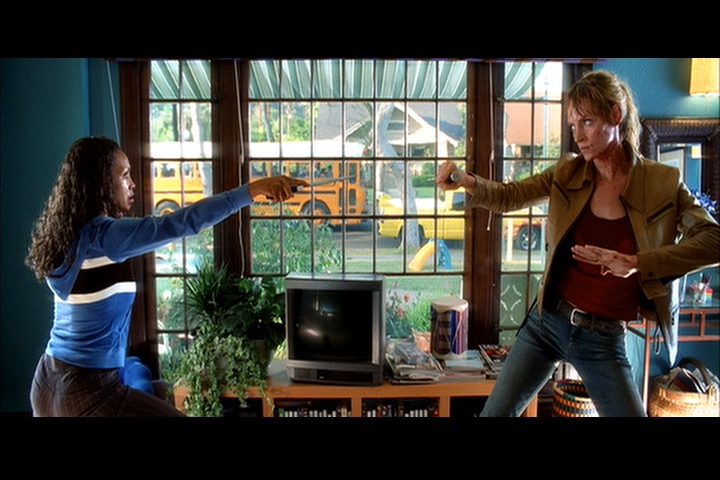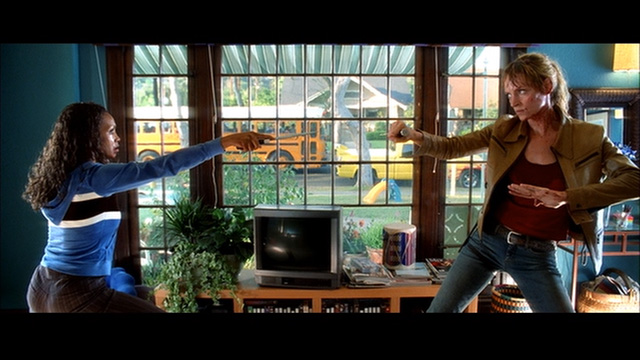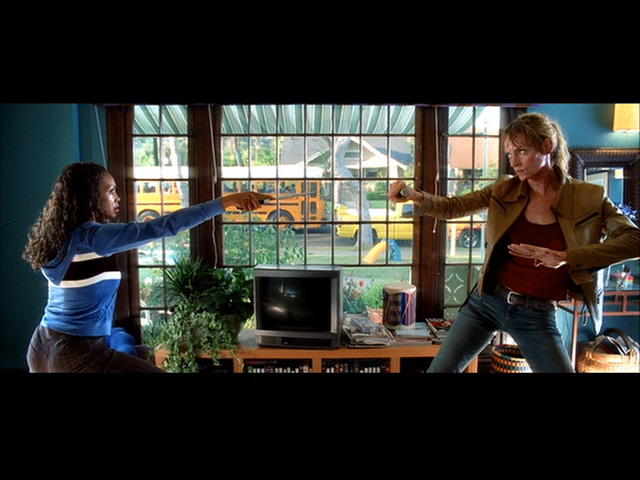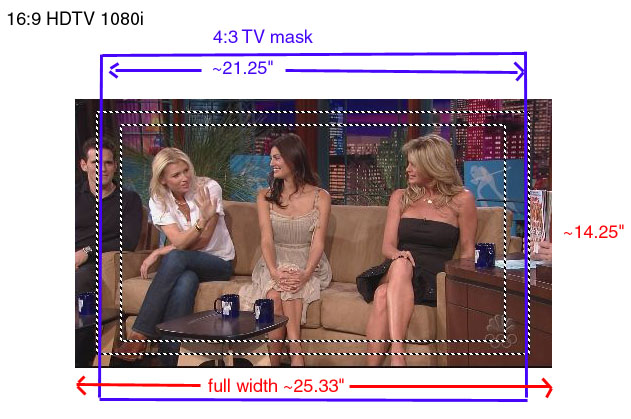I've got a Philips HD 4:3 TV (27PT8302/37) that I enjoy wayching cable-broadcast HD movies on (staying outta the BR vs HD-DVD war). I have a Motorola HD-capable cable-box connected via component to my TV - no HDMI connection (or HDCP capabilities dammit). For all HD television & Widescreen movies, I have to hit the 'compress 16:9' button on my remote to view the broadcasts in proper widescreen. The cable box doesn't seem to do any letterboxing or anything of that sort - I have to control aspect ratios with my tv remote. When viewing HD movies "shorter" then 16:9, the cable box/company adds small letterbox boxes to the top and bottom of the screen. After shrinking down to 16:9 with the remote, I can just see the 2 sets of letterboxes and the movie appears correctly. Here's where the problem is... HD movies that are "taller" then 16:9 (whatever aspect ratios that may be) cannot be displayed correctly. They are broadcast basically as 'full-screen' - with no letter boxes. Either I view them as too tall (in 4:3 mode - filling up the screen), or I use my remote's 16:9 squeeze button, and view the movie too skinny - everybody looks squished. I've been thinking about this for a while, and came up with a possible reason why I can't see things properly... Basically, I've surmised that it comes down to the fact that people either have a widescreen TV, or a 4:3 TV, like me. Watching a "taller" then 16:9 picture needs to be displayed completely differently on both setups... For a widescreen TV, the cable box would need to add letter boxes to the left and right side of the picture.. but for 4:3, you'd need small letter boxes added to the top and bottom. So the cable companies just decided to do neither. And it seems that letterbox signals that come over cable were added at the source, and not added at my cable box, then there's nothing I can do. I'm assuming the cable companies are not caring too much about the 4:3 HD crowd - we're probably not that high a percentage. I've included the settings on my Motorola cable box below, though I believe it is setup correctly. Is anyone with a widescreen HD set also experiencing the same issues with movies "taller" then 16:9? Do widescreen tv's have more options for these kind of things? Any way I can view these movies correctly? Thanks!!
Motorola HD Cable Box
TV Type: 4:3 Letterbox
YPbPr output: 1080i
4:3 override: 480p
+ Reply to Thread
Results 1 to 30 of 35
-
-
The problem here is that you need to set the cable box up so that it shows that you have a 16x9 WS TV.
Instead you have it set up as if you have a 4:3 TV.
Yes you have a 4:3 TV as far as the screen goes but being a HDTV your 4:3 TV has a 16x9 "compression" mode.
So you need to set the cable box to 16x9 TV and set the TV to 16x9 compression mode ... at least for true 16x9 WS HDTV channels.
- John "FulciLives" Coleman"The eyes are the first thing that you have to destroy ... because they have seen too many bad things" - Lucio Fulci
EXPLORE THE FILMS OF LUCIO FULCI - THE MAESTRO OF GORE
-
I'm not having problems with "true 16x9 WS HDTV' programming, my TV remote toggles the '16x9 Compression mode'. It's already giving me the correct type of signal for using this mode. But the problem is with programming "taller" then 16x9 - then the '16x9 compression mode' will shrink it too much.Originally Posted by FulciLives
-
You need to better explain what you mean when you say ... programming "taller" than 16x9Originally Posted by akrako1
That doesn't make any sense.
Also since the cable box TV TYPE is set to 4:3 letterboxed then you are not getting full 16x9 WS HDTV on the TV
Your comments make no sense.
- John "FulciLives" Coleman"The eyes are the first thing that you have to destroy ... because they have seen too many bad things" - Lucio Fulci
EXPLORE THE FILMS OF LUCIO FULCI - THE MAESTRO OF GORE
-
OK, maybe 'taller' wasn't the correct term. Here's my thinking, something like Lord Of The Rings is shot in very wide widescreen (it's physically shorter on your tv then a proper 16x9 WS film). I'm sure you have noticed this. The cable company will add black bars at the top and bottom of the screen. I'd call this 'shorter' then 16x9. My problem is with films that are 'taller' then 16x9, ie, the top & bottom black bars should be smaller then with regular 16x9. Using 16x9 compression mode on my HDTV gives me one standard size of black bars, which are too big for these types of movies. Clear?
-
Oh dear ...
How to explain ...
You have a 4:3 TV
So the aspect ratio of LORD OF THE RINGS (which is 2.35:1) is going to look EXACTLY the same regardless of what setting (on or off) you have for the 16x9 compression mode.
However ... if you have 16x9 compression mode on ... you will get an overall sharper, crisper image than if you did not have the 16x9 compression mode on. This is because the TV takes advantage of the extra resolution inherit in a 16x9 WS video signal. Assuming the video signal is 16x9 WS enhanced.
Now if you had a 16x9 WS TV (I mean if that was the true aspect ratio of the screen) then a 16x9 WS enhanced video would automatically stretch to fill the extra width and you would have less black on the top and bottom.
But you don't have a 16x9 WS TV ... your screen is 4:3 instead.
- John "FulciLives" Coleman"The eyes are the first thing that you have to destroy ... because they have seen too many bad things" - Lucio Fulci
EXPLORE THE FILMS OF LUCIO FULCI - THE MAESTRO OF GORE
-
I think I can help but you need to give the model number of the cable box and the method of connection to the TV.Originally Posted by akrako1
The modes you say you are using indicate you are connected SD. Those don't work in 1080i HD mode.
In other words, if you are receiving 1080i, you can't toggle 'Compress 16:9" at least on mine. That is only available for SD 4:3 (for letterbox). The toggle is "4:3", "Expand 4:3" and "Compress 16x9". -
@drewzor
Are you on crack?
You surely are not helping as your figures are way off ... even for the PAL format.
- John "FulciLives" Coleman"The eyes are the first thing that you have to destroy ... because they have seen too many bad things" - Lucio Fulci
EXPLORE THE FILMS OF LUCIO FULCI - THE MAESTRO OF GORE
-
@drewzor
Perhaps I was a bit harsh but your figures are not really correct and just confusing things.
The main thing to remember here is that we are dealing with a NTSC HDTV that is a tube with a 4:3 aspect ratio ... but the TV does have a 16x9 WS compression mode.
I am going to use an example with pictures
For my example I am using the USA Region 1 DVD release of KILL BILL VOL. 1 which is a 16x9 WS anamorphic DVD with an aspect ratio of 2.35:1
Here is what the original DVD looks like. The image is 720x480 resolution but it is 16x9 WS anamorphic.
Original image as stored on the DVD (720x480):

Now this gets resized for a TV and not going into details of the resolution (other than we start with the above image) this is what you see on a 16x9 WS TV
Image on a 16x9 WS TV

Notice that the image overall is in a 16:9 (aka 1.78:1) ratio but the actual image of the film (not counting the black) is in a 2.35:1 aspect ratio.
Now here is what the DVD looks like on a TV with a 4:3 (aka 1.33:1) screen
Image on a 4:3 (1.33:1) TV screen

Notice that the image overall is in a 4:3 (aka 1.33:1) ratio but the actual image of the film (not counting the black) is in a 2.35:1 aspect ratio.
Now the person who started this thread said he has a 4:3 HDTV with a 16x9 WS compression mode. As I said before ... if the video is 16x9 WS enhanced (aka anamorphic) and the 4:3 television has the 16x9 WS compression mode turned on ... the image will be crisper and sharper compared to if the 16x9 WS compression mode was turned off. This is due (very technical) to the way that a 4:3 TV with a 16x9 compression mode works ... in short it can show more detail from a 16x9 WS enhanced source ... but ....
Either way (16x9 WS compression mode on OR off) you still get THIS on the TV:

I hope that clears it up a little bit ...
- John "FulciLives" Coleman
P.S.
Here is a link to the Philips website ... this is a direct link to a page that is ALL about the model TV we are talking about here: CLICK HERE"The eyes are the first thing that you have to destroy ... because they have seen too many bad things" - Lucio Fulci
EXPLORE THE FILMS OF LUCIO FULCI - THE MAESTRO OF GORE
-
Just a quick note here ...
I read the downloadable manual and searched some other information about this TV on the Philips website (link is in my post above at the very bottom of the post) and nowhere does it explain what the different FORMAT modes do on this TV.
It tells you how to change the FORMAT and what the 3 FORMAT modes are ... but not what they do ... talk about a lousy manual!
Anyways the 3 modes are:
1.) 4:3
2.) Expand 4:3
3.) Compress 16:9
I would assume that option 3 is the correct option for a 16x9 WS enhanced (aka anamorphic) video ... I assume that 4:3 means normal 4:3 ... but I have no clue what "Expand 4:3" means!
- John "FulciLives" Coleman"The eyes are the first thing that you have to destroy ... because they have seen too many bad things" - Lucio Fulci
EXPLORE THE FILMS OF LUCIO FULCI - THE MAESTRO OF GORE
-
Not exactly clear. I have a Philips 27PT830H an earier version of your TV. This TV has been through factory service center alignment.Originally Posted by akrako1
When connected to a 6200 or 6412 Motorola HD Comcast tuner (set to YPbPr/HD=1080i/SD=480p), the TV auto detects 1080i on the wideband component input (upper block) and flashes 1080i on the screen.
A 1080i 16:9 broadcast is displayed this way. The "compress 16:9" control is inactive during HDTV reception. About 2" is cropped from the left and right. The station logos (aka bugs or dogs) are always fully visible in the corners. To me this is an acceptable compromise for a 4:3 tube. 2.35:1 movies are letterboxed within the 16:9 frame.

Wide SD broadcasts and DVD playback are handled differently. They are displayed as letterbox within the 4:3 frame and the controls you mention are active. The choices on my set are:
4:3 -- widescreen shows as normal 16:9 letterbox inside the overscanned 4:3 frame.
"Expand 4:3" -- this expands the picture vertically to almost fill the screen (tall people).
"Compress 16:9" -- reduces the vertical size to adapt to 2.35:1 aspect.
Note that on this set all 480p lines are displayed inside the defined vertical dimension. The TV generated black bars are not scanned. But for 4:3 letterbox (from SDTV), the top and bottom bars are part of the picture and do absorb vertical scan lines. 480i input is upscaled to 1080i.
So, does that help? -
First, thanks for all replies.
EdTV, first, your informative answers always kick my ass. I'm at work, but I'll get the model # of the Motorola cable box when I get home. I connect via component. No DVI or HDMI on the TV. This Philips model does not flash 1080i on the screen when receiving 1080i signal, and I DO have access to all 3 modes (4:3, expand 4:3, and Compress 16:9) while receiving any signal including HD. It is also good to know that scan lines aren't wasted in 'Compress 16:9' mode. That should also mean no worries about image burn-in in this mode (?). So I wonder about the 2 inches that are cut off on your 4:3 tv. I appear to see all in HD, but some DVD's are noticably missing the far L & R edges. You mention that your TV was 'factory service center alignment' - is this typical of Philips?
FulciLives, thanks for posting the screen caps, it makes things clearer. However I'd like to see the same type of thing with a movie that is around 14:9 (or somewhere inbetween 4:3 and 16:9). If you could produce such a thing, I think we could easily see what I'm talking about: a 14:9 movie will need to be treated totally differently depending on if the TV is WS or 4:3 - ie. for a 4:3 TV, you need small bars added to the top and bottom, but for a 16:9 TV, you'll need verticle bars added to the left and right. So the cable company broadcasts with neither, and I'm stuck with either 16:9 or 4:3, both of which aren't right.
A little off topic, but would it theoretically look better for DVD viewing to setup my DVD players for a widescreen tv, and then leave the TV is 16:9 compression mode? -
14:9 is not a broadcast standard though. It is a 4:3 broadcast for letterboxing. If you watch it on a 16:9 TV you will get pillarboxing and letterboxing. I find it hard to believe that you aren't getting at least letterboxing.
I have a 4:3 TV with 16:9 switching. For most digital broadcasts (and for DVDs) the playback device (PVR, DVD player) is set to think it has a 16:9 widescreen TV attached. For some digital broadcasts (eg. The Family Guy) I set the output to 4:3.Read my blog here.
-
I know 14:9 isn't a standard (I don't know if a movie even exists in this format). I just gave it as an example as to what I'm referring to as 'taller' then 16:9, but not 4:3)
-
Well some movies are shot in an aspect ratio of 1.66:1
So you have 4:3 (which is 1.33 then you have 16:9 (which is 1.78:1) meaning that 1.66:1 is somewhere in between.
then you have 16:9 (which is 1.78:1) meaning that 1.66:1 is somewhere in between.
1.66:1 is treated one of two ways on a DVD Video disc.
It is either 4:3 Letterboxed ... meaning the image completely fills the screen from left to right but has black on the top and bottom ... or it can be 16x9 WS anamorphic ... in that case the image fills the screen from top to bottom but has a bit of black on either side.
For image purposes I have THE ROCKY HORROR PICTURE SHOW on NTSC DVD and it is 16x9 WS anamorphic with an aspect ratio of 1.66:1
However ... at least off the top of my head ... I can't think of any movies I have (on DVD) that are 1.66:1 but are standard 4:3 Letterboxed instead of 16x9 WS anamorphic.
.
.
.
OK ... I was looking through my collection just now and I couldn't find a movie that was 1.66:1 4:3 Letterboxed but I do have one ... but a friend of mine has it on loan. If I can get it from him soon (this weekend is most likely the soonest) then I'll post pics ...
- John "FulciLives" Coleman"The eyes are the first thing that you have to destroy ... because they have seen too many bad things" - Lucio Fulci
EXPLORE THE FILMS OF LUCIO FULCI - THE MAESTRO OF GORE
-
Alright 1.66:1 - that's the key! I've noticed that lots of movies shown on broadcast channels (abc, nbd, cbs) are shown in something that looks like it might be 1.66:1. Maybe they're doing this intentionally by clipping some of the far left and right, so it's bigger on the screen... but any way about it, I can't seem to view them properly. I've found these to always be broadcast with no letter boxes at all - leaving it up to the tv/cable box setup to correct. Any ideas how I could view these in proper aspect ratio?
-
I'll answer this later when I am in front of the set.
Recommends: Kiva.org - Loans that change lives.
http://www.kiva.org/about -
My cable box doesn't have a model # listed on it. It is a Motorola HD Capable box distributed by Comcast. On the front it's got a smart card reader, usb, a/v in, among others, and on the back, it got all the outs (including DVI), an ethernet port, firewire, and others. I can try and match it up visually if Comcast only uses a few models..
There are a few LONG letter/numbers on the back. Might be serials... one starts with UA000.. another starts with CNAO00 -
Does it look like this? ... back later
http://broadband.motorola.com/consumers/products/dct6200/Recommends: Kiva.org - Loans that change lives.
http://www.kiva.org/about -
I have an older Region 1 release of Kubrick's A Clockwork Orange with is 1.66:1 matted letterbox (4:3).
A number of FTA analogue broadcasts over here are 14:9 (in a 4:3 frame) - a kind of compromise between those with 4:3 TVs and no DSTB, and those with widescreen and digital recievers. It is not consistent, however. Some shows are 16:9 on the digital channel, and fullscreen 4:3 on FTA analogue. Others are 16:9 on both. Then there is this hybrid 14:9 bastardisation.
All FTA digital over here is broadcast as 16:9, with whatever pillarboxing is needed. The STB takes care of zooming for 4:3 material.
/* Edited for clarity */Read my blog here.
-
OK. I am renting a DCT-6200 for the computer room and a 6412 for the living room "mini-theater".
The Philips 27PT830H lives in the computer room at about 4ft. viewing distance. This model was one of the first Philips CRT designs and has gone though a few revisons. Starting in 2004 these were manufactured in Mexico. The models I know about are as follows starting with the first "Made in Mexico" (mine). Most of the difference is in the "wideband" input board. This is the upper connector block on the back.
27PT830H -- The upper connector block has "wideband" YPbPr (good for 480i, 480p or 1080i) and VGA (good for 640x480@60 Hz, 480i, 480p, 540p, 1080i when using Powerstrip software from a computer).
I've also seen models with DVI or HDMI in place of the VGA.
Your model seems to only have the YPbPr and audio connectors at the top (rear). Am I right?
It shares many specs with the Magnavox 27MS5402 but the Magnavox (also a Philips brand) is further cost reduced by substituting a normal 3 line comb filter for the digital 3D combfilter of the Philips branded model. I wondered at the time if the difference was only in the printed spec. They are both made in the same Mexico plant.
All the models until yours split the lower/upper connector blocks into SD only (lower) and "wideband" (upper). 480p and 1080i were only possible on the upper YPbPr connectors. The lower YPbPr connectors were for 480i only.
I have no experience with your model, but for history sake, try connecting the HDTV cable box to the upper connector block and see if the HD modes differ. The upper block shows as input 4 on my system. -
You will only get two resolutions off broadcast and cable 4:3 and 16:9. Others are letterboxed inside these frames as shown here.Originally Posted by akrako1

PS: I meant to say aspect ratios not "resolutions". -
I'm currently running the cable box into the 'CVI' input on the back, and my DVD Recorder into Input 4. They both are component inputs. I'll switch them and let you know if there's any difference.Originally Posted by edDV
If that's correct, and the above suggestion doesn't work, then I'm pretty sure the networks are screwing up some of their broadcasts. I've noticed it specifically on TNTHD. Putting the tv in 'compress 16:9' mode make the movie slightly squished, while normal 4:3 mode stretches things...Originally Posted by edDV
Thanks for all the info!
Though to be honest, the networks are just getting their act together in the HD realm. Up until recently some HD shows had SD title screens, and awkward edits, and they really don't know what they're doing with commercials. Some are aired with no letterboxing, some with, and some stretched. SD Movie trailers are especially annoying because, with my 4:3 TV, everything is already letterboxed. But since it's SD, it's also got pillerboxes. So inside the small box I've got left, you've got a widescreen trailer with it's own letterboxing. Talk about not impressive. Finally, I'm starting to see some nice HD trailers - taking up the whole 16:9 area... I guess things can only get better... -
Expect that to continue for some time to come. We still get ads in all formats on FTA digital broadcasts. I don't have a problem with ads shot 4:3 - there is still a lot of older equipment in use. But ads shot 16:9 and then broadcast 4:3 with matted letterboxing does seem pretty dumb.Though to be honest, the networks are just getting their act together in the HD realm. Up until recently some HD shows had SD title screens, and awkward edits, and they really don't know what they're doing with commercials. Some are aired with no letterboxing, some with, and some stretched. SD Movie trailers are especially annoying because, with my 4:3 TV, everything is already letterboxed. But since it's SD, it's also got pillerboxes. So inside the small box I've got left, you've got a widescreen trailer with it's own letterboxing. Talk about not impressive. Finally, I'm starting to see some nice HD trailers - taking up the whole 16:9 area... I guess things can only get better...
I still wish they would broadcast movies in their original aspect ratio, rather than zooming to fill a 16:9 AR. Last easter one of our FTA broadcast Passion of the Christ uncut and in 2.35:1 (and without ads). I wish more films were broadcast this way.
Of course, then we would have people complaining about not getting the full value out of their nice new HD widescreen TV because of those evil black bars (luddites).Read my blog here.
Similar Threads
-
Help with MP4 commands for aspect ratios
By tigerb in forum Newbie / General discussionsReplies: 3Last Post: 26th Apr 2012, 14:33 -
MPEG-1 on DVD with different aspect ratios
By DRP in forum Authoring (DVD)Replies: 8Last Post: 15th Aug 2010, 03:16 -
iMovie and aspect ratios
By sphinx99 in forum MacReplies: 3Last Post: 11th Mar 2010, 00:18 -
multiple aspect ratios on one DVD?
By towtruck in forum Authoring (DVD)Replies: 11Last Post: 7th Jul 2008, 03:58 -
Aspect Ratios
By gayclarke in forum Authoring (DVD)Replies: 3Last Post: 15th Sep 2007, 16:13




 Quote
Quote